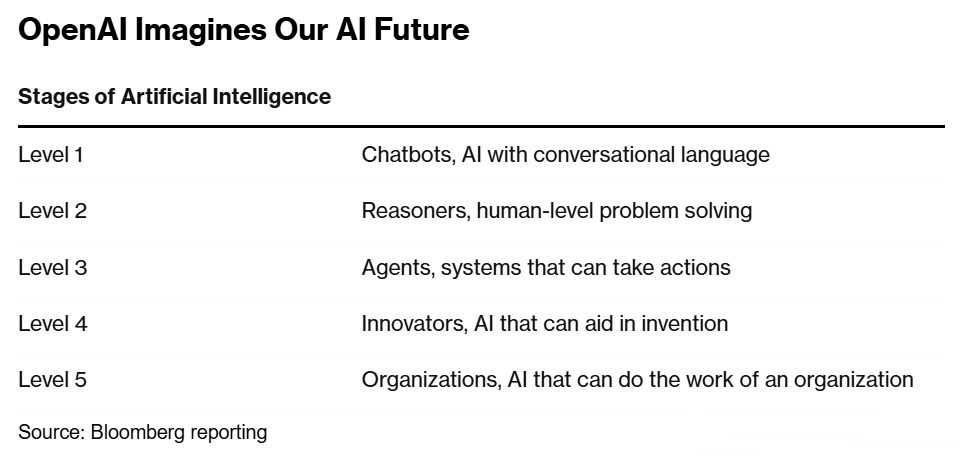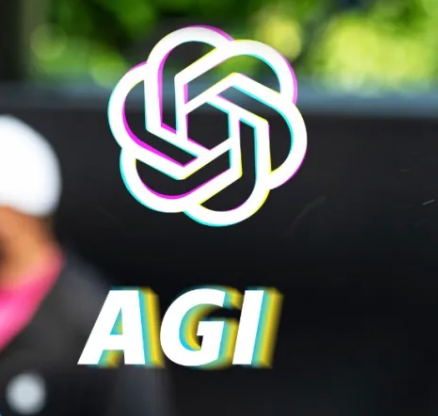Must-See! The 'Divine Prediction' of AI Development's 5 Major Stages: When Will AGI Achieve a Breakthrough?
![]() 09/05 2025
09/05 2025
![]() 629
629


Do you still recall this diagram? It represents OpenAI's internally - defined roadmap to Artificial General Intelligence (AGI) in 2024.
As evident from the diagram, OpenAI has segmented the journey towards the ultimate AGI into five major tiers:
L1: Chatbots, which are AI systems with conversational capabilities.
L2: Reasoners, AI systems capable of solving problems in a manner similar to humans.
L3: Agents, AI systems that not only possess the ability to think but also can take actions.
L4: Innovators, AI systems that can assist in invention and creation.
L5: Organizers, AI systems capable of handling organizational tasks.
As we enter September 2025 and reflect on OpenAI's five - tier roadmap predicted the previous year, we can't help but be amazed at how AI's development and evolution have closely adhered to this roadmap. It truly was a remarkable prediction.
From the proliferation of various chatbots to problem - solving through reasoning and generation, to the development of agents that can take actions and have already made contributions to invention and creation in certain niche areas, and finally, to AI systems capable of completing organizational tasks.

L1 Chatbots and L2 Reasoners are now widely used in our daily lives, with tools such as DeepSeek and Doubao. AI - based chat and reasoning have become deeply integrated into our work and personal lives.
01 L3 Agents
Let's delve into L3 Agents, which are AI systems that not only have the capacity to think but also can take actions.
Your initial thought might be Manus. It not only answers questions but also aids you in executing tasks by automatically calling on external tools to complete complex jobs.
Zhipu has just launched AotuGLM, the world's first universal mobile Agent. It can be seen as bringing Manus - like capabilities to your smartphone.
Now, picture this scenario: you're in a meeting, and all you need to do is send a single message to your phone to make it 'come to life' and place an order for you. For example:
"Help me order a large iced Americano from the nearest Luckin Coffee on Meituan Waimai."
As you can observe, the moment the AI receives the task, it starts executing it promptly.
It will directly take control of your phone and complete the food - ordering task without you having to switch between multiple apps.
Well, the immediate impression is that it's extremely convenient and intelligent.
The capabilities of L3 will also be seamlessly integrated into our work and daily lives, finding applications in various apps.
02 L4 Innovators
Now, let's turn our attention to L4: Innovators, which are AI systems capable of assisting in invention and creation.
In the field of drug development, bringing a new drug to market typically takes over a decade, with an investment ranging from $1 billion to $1.5 billion. However, the success rate is a mere one in ten. This is the harsh reality of new drug development.
Both Contract Research Organizations (CXOs, which handle pharmaceutical outsourcing) and pharmaceutical companies are embracing AI. In the capital market, AI - driven pharmaceutical concept stocks have also triggered a wave of stock price surges.
The development of an innovative drug can be roughly divided into three stages: the formulation of target hypotheses and the determination of drug targets, the optimization of potential molecules and the assessment of preclinical candidate compounds, and finally, clinical trial validation. Traditional pharmaceutical R&D is time - consuming and expensive. As common proteins or pathways have been nearly fully explored, drug discovery has become increasingly challenging. By the time a drug reaches the clinical trial stage, it requires significant financial investment, far exceeding the costs in the preclinical stage.
In China, AI platforms mainly exert their influence in the preclinical stage, which encompasses disease mechanism research, target discovery, compound screening, Absorption, Distribution, Metabolism, Excretion, and Toxicity (ADMET) prediction, and more.
Xu Xiaolin, the founding partner of Huagai Capital, stated, "AI's role in preclinical research is mainly manifested in three aspects. First, it accelerates target discovery and compound design. Second, it reduces experimental failure rates. Third, it optimizes resource allocation. Although the cost of preclinical research is not high, AI's efficiency improvements at this stage also contribute to subsequent clinical research, ultimately reducing overall R&D costs and time."
In September 2024, Insilico Medicine's AI - candidate drug ISM001 - 055 (now approved with the generic name 'Rentosertib') achieved positive results in a Phase IIa clinical trial. This drug targets idiopathic pulmonary fibrosis (IPF), a chronic, scar - forming lung disease characterized by a progressive and irreversible decline in lung function. The drug's data showed good safety and a dose - dependent efficacy trend, making it the world's first AI - driven drug concept validation case. Both the target and molecular structure of this candidate drug were discovered through generative AI.
In these niche fields, it is widely believed that AI will assist humans in achieving even more inventions and creations in the future.
03 L5 Organizers
L5: Organizers, which are AI systems capable of completing organizational tasks. When L1 - L4 can cover all industries, all aspects of work, life, and learning, and data has achieved interoperability, I believe the ultimate AGI is not far off. At that time, a supreme AGI will emerge to 'oversee' all agents, applications, and external tools, assisting humans in completing various tasks, just like 'Jarvis' in the movie Iron Man. As Li Xiang, the founder of Li Auto, said in 'Luo Yonghao's Crossroads': "Human intelligence has not seen significant development for a long time, and AGI may be the 'only opportunity' for human intelligence to make a leap."
If we can achieve an intelligence upgrade with the help of AGI, humans will remain the rulers of Earth's civilization. If our intelligence does not evolve, we will undoubtedly face elimination.
Elon Musk was once asked, "When AI can do everything for humans, and we don't even need to work, what is the meaning of human existence?"
Musk remained silent for a long time before responding, "That's a tough question, and I don't have a good answer either."
This, perhaps, is also the ultimate question left for each of us to ponder.
I believe that in our lifetime, we will definitely witness significant advancements in this regard.







